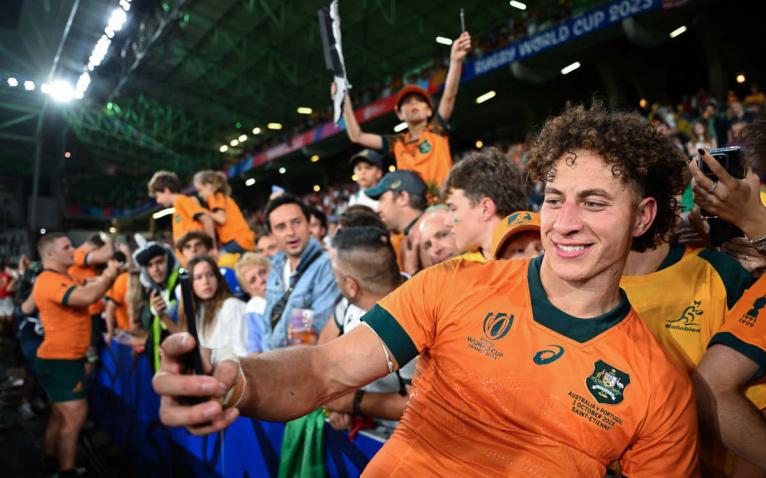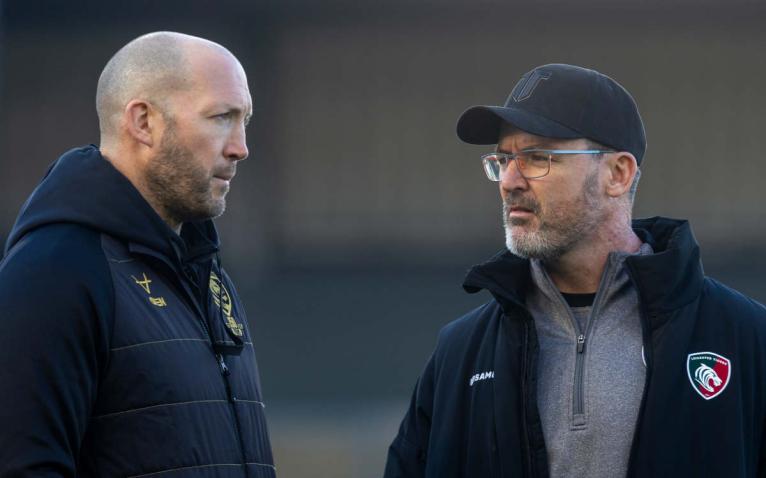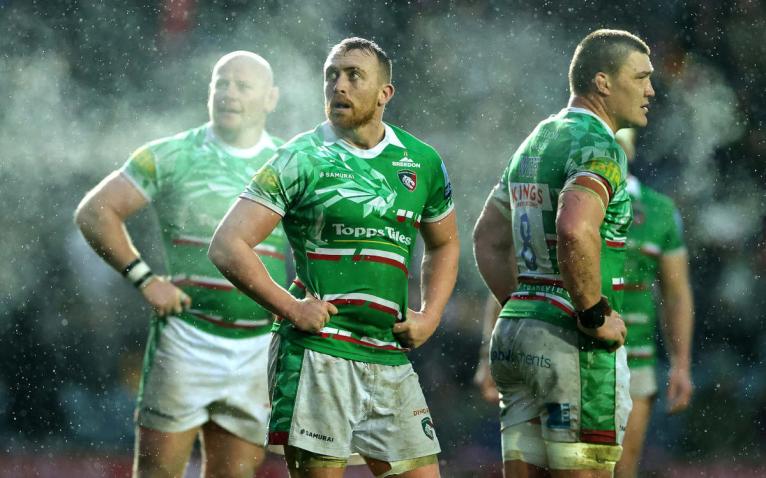Before the Revolutionary ‘Storm in the East’ ever ignited in 1918, the father of Russian Communism, Vladimir Ilyich Lenin wrote a book entitled: “One Step Forward, Two Steps Back: The Crisis in our Party”. He described the factionalism of a party which had split into two movements, ‘Bolshevik’ and ‘Menshevik’. According to Lenin, the first were the true revolutionaries while the second posed as mere political opportunists.
Australian rugby has elements of both. On the one hand, there are the opportunists: when ex-chairman of Rugby Australia, Hamish McLennan, first trumpeted the signing of young League back Joseph-Aukuso Sua’ali’i to a reported $1.6m AUD contract at the end of 2024, his accompanying claims were sensationalist:
“The criticism of [Sua’ali’i] and the deal is crazy. Before he pulls on a jumper, he has generated over $50million worth of publicity for rugby … and the first time he plays for the Waratahs in front of a full house, he pays for himself.”
Now the marketing curtain has been pulled away, to reveal that it was a case of one step forward, two steps back. McLennan ignited a war with the sister code, and the Sydney Roosters signed rising star Mark Nawaqanitawase in retaliation. ‘Marky Mark’ and Joseph are quite likely to pass each other in the corridor, but they will be walking in opposite directions.

Last Thursday, RA chief executive Phil Waugh attempted to put a positive spin on the wingman’s defection: “The outside backs are a position of strength for us, with great depth coming through. We are confident we are well-stocked with talented wingers for the future”. The truth is that it is a poor bargain for Australian rugby’s future.
Nawaqanitawase enjoyed a breakout international season in 2022-2023, and had quickly become a centrepiece of Wallaby planning to build a physical, aerially-dominant back three to rival the likes of Joe Roff, Chris Latham, Ben Tune in the early noughties. Now they have to start from scratch all over again. All the development work invested in Nawaqanitawase – ever since he scored one of the Junior Wallabies’ three tries in the 2019 under 20’s World Cup final – has been lost.
It is all part and parcel of Rugby Australia’s game of snakes-and-ladders. Solid progressions and the building of foundations has been exchanged too eagerly for the flourish of a marketing gesture. If there are grounds for hope, they will be found in the transfer of Dan McKellar to the Leicester Tigers in the English Premiership. McKellar already had a substantial grounding as head coach at the Brumbies, then forwards assistant with Dave Rennie’s Wallabies in 2021-2022.
In the long run, it is a move that will benefit rugby in his homeland. McKellar has the chance to grow his rugby I.P significantly in competitions like the Premiership and the Champions Cup, and from a shared philosophical base
He was being groomed as the next head honcho of Australia after Rennie departed, but after slithering down the snake of Eddie Jones’ sudden appointment McKellar has jumped on to a parallel ladder and taken up the same role at Welford Road.
In the long run, it is a move that will benefit rugby in his homeland. McKellar has the chance to grow his rugby I.P significantly in competitions like the Premiership and the European Champions Cup, and from a shared philosophical base. The tactical approach at Leicester is probably the closest to the Brumbies’ that McKellar could hope to find anywhere in Europe. It is a ready-made opportunity for mutual improvement, a rock-solid marriage made in rugby heaven.

After a tough start in which Leicester lost four of their first five games, McKellar’s Tigers have won their last three matches by increasingly wide margins. He did not attempt to disguise his admiration for the club’s tradition of strong play at set-piece, in defence and the kicking game after a thumping 47-3 win over the Newcastle Falcons:
“What I loved about that performance is it had ‘Leicester Tigers’ written all over it.
“You could clearly see our DNA, and what we value as a team.
“Particularly in the [wet] conditions, which were obviously challenging for the players and our supporters, I thought our execution and discipline were outstanding.
“Despite the fact results weren’t going our way early on, we were all on-board with the path we were taking and [we] trusted that sticking together, backing the process and preparing well would lead to good performances.
“I said at the time that I had been here before, when I took over at the Brumbies. Evolving your game but maintaining your principles as a club takes time, but I have to say that the buy-in from day one has been there and the performances these past couple of weeks is great reward for our players and staff.”
Dan’s been terrific, He has got a really good, ‘Australian Way’ of wanting to play. We want to be more ambitious, and move the ball more. I like the way it is heading, I like him. The team’s trying to develop and move quickly.
Ben Youngs
The building blocks for both Leicester and the Brumbies are still in place: Tigers rank #1 in scrum penalty differential [+12 after eight rounds], 2nd in mauls set after lineout, 2nd in defence with only 21 tries given up, 2nd in the number of kicks launched per game [35]. That is the bedrock of Leicester and the Brumbies.
At the same time, McKellar is looking to build more Australian outbuildings on top of those Midlander foundations: the number of tries scored from 4+ phases is slightly up on Leicester’s 2022-2023 figure, there are an average of seven more rucks set per game, and the ratio of 0-3 second LQB from the ruck has risen from 38% last season [9th in the league] to 44% this [4th].
It is a start. Tigers are beginning to sit on good field positions for longer than they did with ball in hand. As the club’s England cap centurion Ben Youngs commented, “Dan’s been terrific, He has got a really good, ‘Australian Way’ of wanting to play. We want to be more ambitious, and move the ball more. I like the way it is heading, I like him. The team’s trying to develop and move quickly.”

The Brumbies always place great store on red zone efficiency. They enter the opposition 22 by the simplest means possible – often a scrum or breakdown penalty – and made sure they came away with points from the ensuing lineout. It is an area McKellar sees as critical in the modern professional game. As he put it to TNT Sports’ guru Austin Healey in commentary during the Falcons’ match:
“One of the first things I said back in July was that most games are won in the 22m zone. Whoever can convert [opportunities in that zone] the best, and who can make it into the 22 [most often].”
Tigers were exceptionally efficient in the red zone against both Gloucester and Newcastle over the past two weekends. They have scored 79 points from those situations at an average of four points per entry (three points-per-entry is considered an excellent result) while allowing their opponents a niggardly one point-per-entry in return. Newcastle scored zero points on eight attempts in the last match at Welford Road. You will not lose too many games of rugby with those stats.
The backbone of Leicester’s efficiency is the lineout drive, a McKellar coaching speciality. Unlike most teams, Leicester rarely try to roll the maul infield, they like to keep it straight and parallel to the 5m line:
The area in which Leicester double up with their backs (in the second clip from the Gloucester game) also happens to feature the gleaming pate of the old king, Dan Cole ‘on point’, and leading the drive through on the 5m line. Is there is a player who has done a better job for England, or anyone else, on the comeback trail at 36 years of age? I doubt it.
Once the threat of the maul is established, Leicester can begin to embroider, and it is perhaps here that McKellar’s signature additions from his time in Australia are starting to be felt. He has brought old Canberra favourite Solomone Kata to the club, and he set up a nice short-side try for left wing Ollie Hassell-Collins versus Newcastle:
Kata and Hassell-Collins move back to short-side late, and Solomone’s power in contact does the rest. Ever since the heyday of Tevita Kuridrani and more recently, Len Ikitau and Irae Simone, the Canberra outfit has preferred size and power in their centres rather than an extra ball-player, and McKellar has what he wants in the form of Kata, Matt Scott and Dan Kelly – that strength on short, hard lines into contact:
At the same time, there were some glimpses in the Gloucester game of a wish to grow an Australian graft on to the Leicester root and trunk:
The second of these tries derived from a kick return run back by the Springbok behemoth #8 Jasper Wiese from the halfway line, followed by some very neat hands down the left between Scott, Kelly and Freddie Steward to release Hassell-Collins. That probably would not have happened in 2022-2023, where Tigers might just have repositioned themselves for another kick.
Dan McKellar is very much in his coaching sweet spot at Welford Road. Leicester culture is a reinforcement of what he already knows from the Brumbies, and there are so many ‘givens’ shared between both clubs at set-piece, in defence and the kicking game that he can begin to build on the Australian Way additions sooner rather than later. It is a win-win situation for both club and coach.
If the experiment is successful, Australian rugby stands to benefit from a scenario with no downside, when the prodigal son finally returns to his homeland. There could be several rapid strides forward with very few retrograde steps hobbling progress.
That cannot be said of the recent transaction with League, which will bring Joseph-Aukuso Suaa’li’i to Union at the end of 2024 but which has lost Mark Nawaqanitawase to the sister code now. If you wanted to keep one of those for the Lions visit in 2025, you would hold on to Marky Mark.
He has done the hard yards in the transition from junior to senior professional ranks and earned his stripes against all-comers on international fields all over the world in 2022-23. He was a keeper, primed and ready to play the role, and Rugby is the loser in the tit-for-tat instigated by departing RA chairman Hamish McLennan. But that is where Aussie is in its game of snakes-and-ladders – one step forward and two backwards. The opportunists have held the whip hand, the true revolutionaries who can transform the game neglected. Remember Lenin’s words? “No revolution is worth anything, unless it can defend itself”.


Onwards and upwards for Dan and the Tigers since this piece was published Nick.
The loss of Mark N is a disaster. A home grown marketable potential superstar gone.
Great analysis Nick...! I think that the important thing about these ´cultural traffics´ is to reformulate or strengthen the codes of each coach. How broad and how precise would your experiences be after alternating jobs on both sides of the equator line...? Fortunately, no direct or immediate metrics are available for this kind of enrichment. Greetings.
Cheers Nick, I too am of the opinion DM did himself a huge favour distancing himself from the maniac. Hopefully he can honour his contract at Leicester then have a crack at the Wallabies job, the only thing that concerns me about him is it’s hard to get a read on how much he is making a difference at LT considering some of the formidable cattle he has available, I don’t think we really have a Montoya/Cole/Wiese/Youngs/Pollard/Steward currently in Australia to implement his game plan.
It’s a good move for MacKellar because he will benefit from having to adapt to the northern hemisphere philosophy of trying to win on your merits.
In Australia he and Laurie Fisher had become obsessed with the kiwi way. No doubt due to so many kiwi coaches in Australia. That is, cheating to try and get yourself out of trouble.
The Brumbies were becoming almost unwatchable under them such was their panic and propensity to cheat when under pressure. That is why MacKellar and Fisher got on so well with Rennie. The Wallabies were cheating incessantly under then too which is why we were falling down the rankings, just like the All Blacks. Kiwis of course thought Rennie was fantastic teaching the Wallabies to try and cheat, just like them. That’s the way you play proper rugby isn’t it eh bro ?
That is why kiwis coaches were slowly but surely being sacked in Europe because Europeans got sick of such a negative, cynical game style. It didn’t attract crowds. Crowd numbers are falling in NZ too. They just can’t figure out why. Too funny.
Thanks Nick. I am glad Dan took the role and didn't end up with the Wallabies role yet. He's got years ahead of him and what he achieved here at the Brumbies was impressive so it would be great to see him build even more at Leicester. I also imagine it might be hard for an Aussie coach in terms of media scrutiny? Or is Leicester a more welcoming place than London?
Disappointed about Marky Mark..Do you think Jordy P and Tom Wright could fill his void?
I have got a lot out of this article, Nick. Thanks. Dan is being watched with great interest from down here in Australia.
Just wanted to say Nick, I don’t think there is any other rugby writer who can connect Lenin -> Marky Mark -> Leicester Tigers -> rugby strategy in such an interesting and clever way. Always enjoy your articles. Keep up the great work.
Dan is a really solid coach he has the strength of knowledge of the game from his personal experience and his journey from grass roots to professional rugby pathways
Australian rugby loss is the Tigers gain he will get the best out his players and they will be able to play with the best style of play the Squad strength can offer
I’m sure the tigers fans will appreciate this Aussie’s honesty and commitment to the tigers club the next few years
I thought there were some positive signs for Leicester against Harlequins even though they lost that match about a month or so ago. That was their first Premiership match with Pollard and Wiese playing for them. Their wins against Northampton, Gloucester and an admittedly weak Newcastle suggest that they’re heading in the right direction performance wise.
McKellar’s Brumbies were lazily portrayed as a side who could only score tries from rolling mauls but they grew into a side that could play with some width by the end of his first season as Brumbies coach.